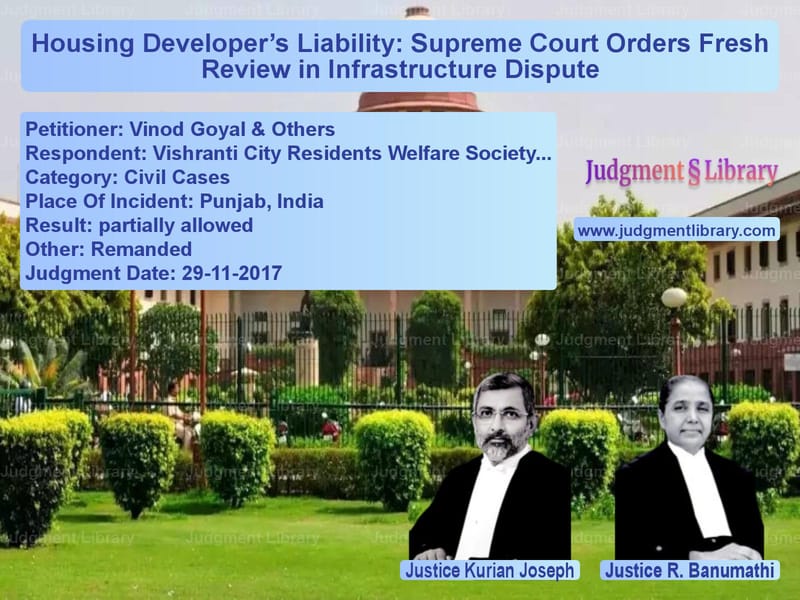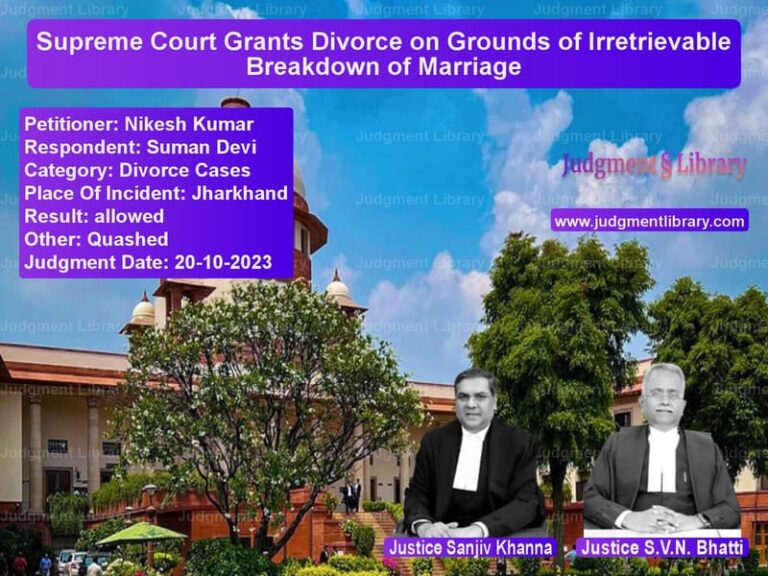Housing Developer’s Liability: Supreme Court Orders Fresh Review in Infrastructure Dispute
The Supreme Court of India recently ruled on a significant real estate dispute in the case of Vinod Goyal & Others vs. Vishranti City Residents Welfare Society & Others. The case revolved around the responsibilities of a real estate developer in providing infrastructure facilities in a residential project and whether individual partners of the developer firm could be held personally liable for financial shortfalls.
The judgment emphasized the obligations of developers under contractual agreements and reinforced the need for government authorities to ensure accountability in real estate development projects.
Background of the Case
The appellants in this case were partners in a real estate development firm, M/S Sai Apartments and Infrastructure Ltd., which was responsible for developing a residential colony in Punjab. The project was approved by the Government of Punjab, and the developer was required to provide basic infrastructure, including roads, electricity, water supply, and sewage systems.
However, after the residents moved in, they realized that several basic amenities were missing. As a result, some residents of the colony approached the Punjab & Haryana High Court, demanding that the government intervene and ensure that infrastructure deficiencies were addressed.
The High Court ruled in favor of the residents, directing:
- That the personal properties of the partners of the developer firm be auctioned to fund the completion of the infrastructure.
- That residents and allottees could file individual complaints against the developer’s partners.
- That the license of the developer firm would not be renewed unless prior approval was obtained from the court.
Aggrieved by this decision, the developer’s partners filed an appeal before the Supreme Court, arguing that they were not personally liable for the company’s obligations.
Petitioner’s Arguments (Vinod Goyal & Others)
The petitioners, who were individual partners of the developer firm, made the following arguments:
- They were not personally responsible for the financial liabilities of the company.
- The High Court had violated their right to due process by ordering the auction of their personal properties without issuing any notice or giving them a chance to present their case.
- The developer had faced delays due to external factors, including government clearances and electricity board approvals.
- The residents themselves had not fulfilled their financial obligations under the allotment agreement, particularly regarding external development charges.
Respondent’s Arguments (Vishranti City Residents Welfare Society & Others)
The residents, represented by their legal counsel, countered with the following arguments:
- The developer had failed to provide the promised infrastructure, leaving residents in difficult living conditions.
- The High Court had acted within its authority to ensure that residents received what they had paid for.
- The developer had made several unfulfilled commitments over the years and had ignored multiple court orders to complete the infrastructure.
- The developer’s financial difficulties should not be an excuse for denying residents their basic amenities.
Supreme Court’s Judgment
The Supreme Court carefully examined the case and ruled that while the residents had legitimate grievances, the High Court had exceeded its jurisdiction in ordering the attachment and auction of the personal properties of the partners without following proper legal procedures.
The key findings of the Court were:
- “The High Court ought to have issued a notice to the partners before directing the attachment of their personal assets.”
- “Developers must honor their commitments, but individual partners cannot be held personally liable without a proper legal basis.”
- “The matter requires reconsideration by the High Court after giving all parties a fair hearing.”
- “The Supreme Court does not wish to interfere with the ongoing infrastructure development efforts but emphasizes the need for legal due process.”
The Court remitted the matter back to the High Court, directing it to hear both parties and ensure a legally sound resolution.
Key Takeaways from the Judgment
- Real estate developers must fulfill their contractual obligations to provide infrastructure as promised to homebuyers.
- Courts must ensure that due process is followed before attaching personal assets of business partners.
- Buyers have the right to approach the courts if a developer fails to deliver on their commitments.
- Legal remedies must be pursued through proper channels, including consumer forums and regulatory authorities.
- The Supreme Court emphasized the importance of balanced judicial intervention in financial disputes between developers and homebuyers.
Conclusion
The Supreme Court’s decision in Vinod Goyal & Others vs. Vishranti City Residents Welfare Society & Others is a significant ruling for real estate law in India. It establishes that while developers must be held accountable for their commitments, due process must be followed before attaching their personal assets. The ruling also reaffirms the responsibility of government agencies to ensure that housing projects comply with their obligations, protecting the interests of homebuyers while maintaining legal fairness.
The case is now set to be reheard by the Punjab & Haryana High Court, where the parties will have another opportunity to present their arguments and reach a fair resolution.
Don’t miss out on the full details! Download the complete judgment in PDF format below and gain valuable insights instantly!
Download Judgment: Vinod Goyal & Others vs Vishranti City Resid Supreme Court of India Judgment Dated 29-11-2017.pdf
Direct Downlaod Judgment: Direct downlaod this Judgment
See all petitions in Property Disputes
See all petitions in Contract Disputes
See all petitions in Consumer Rights
See all petitions in Judgment by Kurian Joseph
See all petitions in Judgment by R. Banumathi
See all petitions in partially allowed
See all petitions in Remanded
See all petitions in supreme court of India judgments November 2017
See all petitions in 2017 judgments
See all posts in Civil Cases Category
See all allowed petitions in Civil Cases Category
See all Dismissed petitions in Civil Cases Category
See all partially allowed petitions in Civil Cases Category







